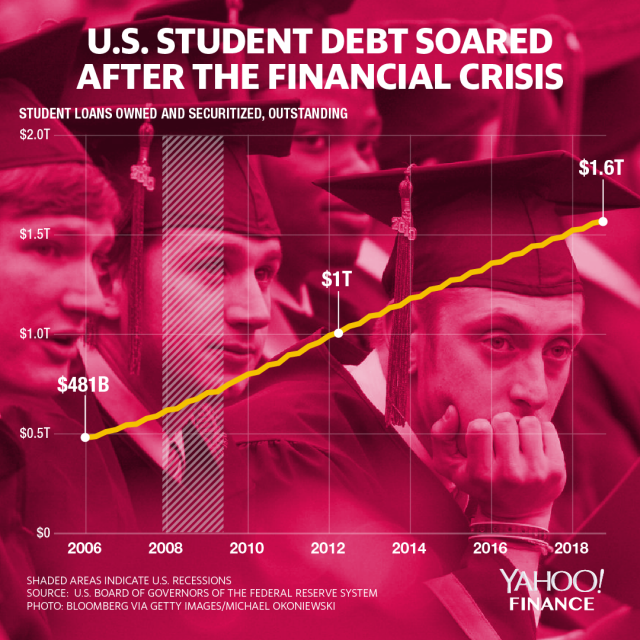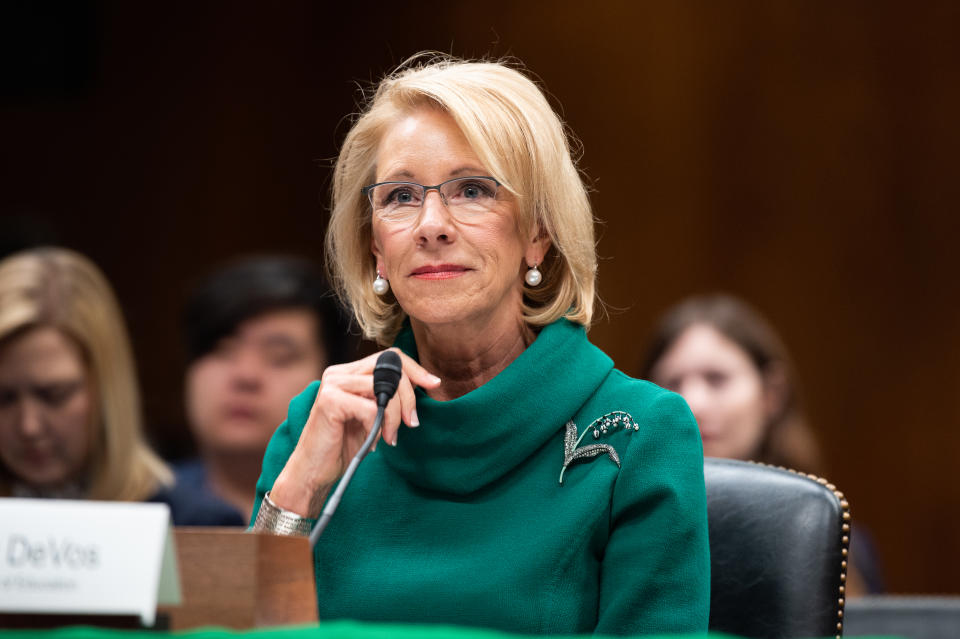'They stole my time’: For-profit college students share horror stories
America’s had problems with for-profit colleges. And history might be repeating itself.
While the economic hit from the coronavirus pandemic is threatening the existence of many colleges, experts believe that for-profit colleges could actually stand to benefit — like they did during the Great Recession.
“For-profit colleges will be marketing more aggressively during this period… and especially at a time when high school students aren't in school near their counselors… traditional mechanisms through which students learn about college options and the value of going to college have been limited,” Josh Wyner, of the Aspen Institute, told Yahoo Finance.
“And so what we've got is a void for for-profit colleges,” Wyner added. “And they’ve got an edge over the competition, because they’ve always been much more sophisticated in how they market to students.”

‘They stole my time’
A 2018 lawsuit filed in the U.S. District Court for the District of Minnesota against Capella University, which recently added two plaintiffs, detailed the mess that some for-profit colleges were leaving students in.
Students were actively recruited by Capella — owned by parent company Strategic Education Inc. (SEI) — for doctoral programs and ended up taking on thousands of dollars in student debt before experiencing significant roadblocks when they actually tried to graduate.
The lawsuit alleges that this was a systematic problem across Capella University.
“Going to Capella was supposed to be a part of advancing my career in life… I feel like I was misled at every turn,” Louis DeWeaver, an Air Force veteran from Michigan in his 50s, said on a recent press call. “They made it sound like there was structure and pathway to completing their online courses within a reasonable time frame and at a reasonable cost. … But I faced roadblocks… at every turn… and every time things slowed down, it cost me more and more money.”

DeWeaver said that when he joined the class action suit, the university tried to kick him out of the program. He ended up withdrawing after two and a half years with $50,000 in student loan debt and no degree.
“And they stole something else from me: They stole my time,” he added. “At my age, I wanted to earn my degree in a time frame… I lost a lot of time and money on the dead end street of Capella University, I would hate to see other vets who are having a tough time during this coronavirus economy suffer at the hands of Capella.”
Capella University dismissed to the lawsuit, stating that it is “without merit” and that the court has “already dismissed 40 of the 45 legal claims and eight out of nine plaintiffs.”
The university added that it wasn’t aware that any veterans such as DeWeaver were involved in the lawsuit, adding:
“Capella University – accredited by the Higher Learning Commission – is proud of its programs, its faculty, its staff, and its continued service to our nation’s veterans, and we remain dedicated to providing flexible, professionally aligned online degree programs for working adults.”

The attorney representing the plaintiffs, Joseph Peiffer, of the law firm Peiffer Wolf, stressed that the for-profit college industry was poised to make a tidy profit during the coronavirus-induced downturn.
“You saw this during the Great Recession,” Peiffer told Yahoo Finance, referring to predatory practices of for-profit colleges. “They target the most vulnerable section of the population,” Peiffer added, noting that with millions of Americans filing unemployment claims, “they think going back to school is the best option for them.”
Peiffer expects thousands of students to be affected by the class action suit. And in response to Capella’s statement, he added: “As much as Capella may want to minimize these students experiences and take away their voices, we intend to hold them accountable. Vets like Louis and Shawn served our country and invested in their education. They deserved far better than Capella.”
‘Poised to do the same thing a dozen years later’
There are some signs of a forthcoming boom in the for-profit sector: Capella’s parent company reported that net income was $23.7 million more this quarter as compared to 2019, “due primarily to higher revenues due to enrollment growth and lower merger and integration related costs,” the company stated in a press release accompanying its 10-Q filing.
Capella saw enrollment increase by 4% compared to the same period last year, and revenue increased 3.4% as a result of that.
Capella — as well as other for-profit chains — have also started put out new TV advertisements (above).
“The truth is, this for-profit money machine already rakes in hundreds of millions of dollars in U.S. education funds from victimized vets and other students,” Peiffer said. “Capella last surfed the wave of the Great Recession in 2008 and 2009 to make huge profits. Now, it is poised to do the same thing a dozen years later.”
Change in the Education Department’s tone
The Obama administration recognized a trend where students attending certain types of for-profit colleges were leaving with high levels of student debt but not being able to obtain quality jobs.
In 2016, the New York Fed noted that enrollment at these schools had “skyrocketed” as the country emerged out of the Great Recession. Debt levels rose as well as students graduating from for-profit institutions generally hold far higher levels of debt than those attending other institutions.
"Career colleges must be a stepping stone to the middle class,” former U.S. Secretary of Education Arne Duncan said in a press release in 2014. "But too many hardworking students find themselves buried in debt with little to show for it. That is simply unacceptable. These regulations are a necessary step to ensure that colleges accepting federal funds protect students, cut costs and improve outcomes. We will continue to take action as needed."
The administration then launched the gainful employment rule to impose greater accountability for “career training programs” to help students.
And according to the department’s data, 1,400 programs, serving 840,000 students — of whom 99% are at for-profit institutions — ”would not pass the accountability standards,” it stated.
The Trump administration under Education Secretary Betsy DeVos has since repealed that rule in 2019. The spurred several lawsuits, including from America’s second-largest teachers’ union and the California Attorney General.
“The Secretary used her authority under the [Higher Education Act] to allow institutions to implement the new rules early as of July 1, 2019,” the most recent 10-Q from Capella’s parent company stated. “Those institutions that implement early are not required to report gainful employment data for the 2018-2019 award year, are not required to comply with gainful employment disclosure… Both Capella University and Strayer University have elected to implement the July 2019 regulations early and have documented their decision to do so as required by the Department of Education.”

‘They took everything from me’
Shawn Cooper, another Air Force vet, expressed regret over even signing up for the entire experience.
Cooper, who lives in Texas with his wife and children, said that at first he was “incredibly proud” to embark on a doctoral program in health administration at Capella.
“After my daughter was born, I really dove into my studies to make my children proud,” he explained. “I had a 4.0 GPA but Capella constantly dragged things out while I was enrolled from 2014 to 2018. No matter how hard I pushed to move things forward, they always slowed things down, changed the rules, and kept digging me for more money.”
The school ended up kicking him out of the program, accusing him of “poor performance,” despite his perfect GPA. When he appealed the dismissal, they rejected that.
“That’s when I knew that I needed to fight back, so I signed up for this lawsuit,” Cooper added. “It’s not in my DNA to just roll over. All I got from my troubles at Capella University was a mountain of debt and a diagnosis of anxiety, but no degree.”
Cooper now owes over $100,000 in student loan debt.
“They took everything from me,” he said, adding that “this is about so much more than the debt. ... I started school when my daughter was born, so I was incredibly busy with school for the first three years. So I’ll never get those years back. I’ll never get those moments that I missed with my daughter back.”
—
Aarthi is a reporter for Yahoo Finance covering consumer finance and education. Follow her on Twitter @aarthiswami. If you attended a for-profit college and would like to share your experience, reach out to her at aarthi@yahoofinance.com
Read more:
'It's too good’: How for-profit colleges entice and hinder Americans
More than 66 million U.S. jobs are at 'high risk' of layoffs amid coronavirus, St. Louis Fed finds
Coronavirus stimulus bill: 7 ways student loan borrowers benefit
Read the latest financial and business news from Yahoo Finance
Follow Yahoo Finance on Twitter, Facebook, Instagram, Flipboard, SmartNews, LinkedIn,YouTube, and reddit.



